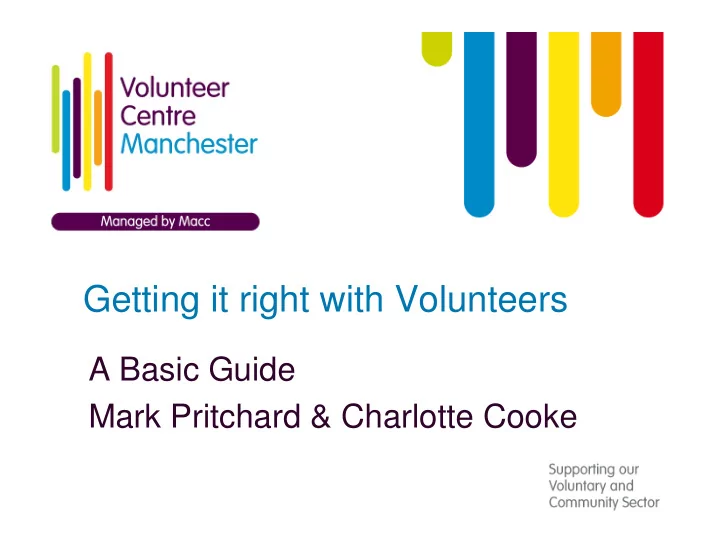

Getting it right with Volunteers A Basic Guide Mark Pritchard & Charlotte Cooke
Aims • Refresh our minds about volunteering • Promote good practice when working with volunteers • Think about positive experiences • Point you in the right direction for extra help
What is volunteering? • What is your organisation’s definition of volunteers? • Where does your organisation draw its definition of volunteering from? • Take a look at the definition you used. Which fits most closely with your day to day work?
Discuss.. “Volunteers are covered by the same protections as paid staff.” True or False? False - however in some cases ‘volunteers’ have claimed their status is that of a worker or employee.
Different types of Intern
Avoiding Implied Contracts At it’s simplest.. remuneration + contract = employee no remuneration + no contract = volunteer
Avoiding Implied Contracts • What is a contract? – Does not have to be a written piece of paper signed by both parties. – Description of a relationship – When payment (consideration) is made in return for work/tasks – That payment may be perks or benefits
Consequences of getting it wrong If volunteers are viewed as working under a contract they maybe be entitled to: • Be paid minimum wage • Be covered by the worker provisions of the anti-discrimination legislation • Not work more than 48hrs per week on average • Four weeks paid holiday each year (pro rata)
Let’s talk paperwork 4 Key Documents • Volunteer Policy • Volunteer Role Descriptions • Volunteer Handbook • Volunteer Agreement
Let’s talk paperwork Volunteer Policy A volunteering policy can be a relatively short and simple document, using clear language. List what you think should be included…
Let’s talk paperwork Volunteer Role Descriptions (Sometimes called task descriptions.) • Remember to avoid employment language • Set expectations, and remember these are two way • Demonstrate what the volunteer can expect to get out of the role
Let’s talk paperwork Volunteer Handbook • This should include day to day information for volunteers, what to wear, where meet/sign in, what to do if they are sick/late etc • Many organisations place their grievance procedures, health and safety policies and so on in the appendices of their handbooks.
Let’s talk paperwork • Volunteer Agreements should – refer to intentions, expectations and privileges rather than rights and obligations – avoid employment-related terms such as contract, sick leave, annual leave, disciplinary procedure, promotion, dismissal, worker, employed, employer and employee – make it clear that the relationship is binding in honour only and is not intended to be legally binding.
Finally…. What support can your organisation access? • Help with recruiting volunteers • Access to free CRB checks for your volunteers • Help with promoting your work or activities to more than 2500 organisations • Advice and guidance on producing or updating policies and procedures • A wide range of training opportunities which can improve the skill sets of your staff. • A chance to network with other voluntary or community groups • Additional support from our partner organisation (e.g. developing a business case, writing a business plan, funding and income generation)
Next Steps For more help and support contact:- Volunteer Centre Manchester W: www.volunteercentremanchester.co.uk E: info@volunteercentremanchester.co.uk T: 0161 830 4770 Facebook: www.facebook.com/VCMOfficial Twitter: @VolunteeringMcr VE Volunteers and the Law publication: http://www.volunteering.org.uk/resources/publications/ volunteersandthelaw
Recommend
More recommend